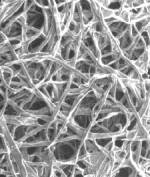figgie said:
ack holy crap!!

20 microns and 19 microns!!!
I will stick with my 8 micron filter thanks!!
wtf??
Bypass valve setting at 8-11 psi??
In otherwords the damn things in our cars wont filter shit!!! They will just bypass most all of it including during the most crucial time... under BOOST!!!
what filter are you using that filters down to 8 microns
I found this info on a motor cycle site but it sound legit to me and so 20 microns should be ok
http://motorcycleinfo.calsci.com/Filters.html

Most oil filters have filter elements made of paper and are effective down to about 40 microns. To the right is a paper element expanded 50 times. In this picture, a 30 micron particle is about this big: o The advanced filters have composite elements made of paper, cellulose, and fiberglass, and are effective down to 15 microns or less. Typically these advanced filters also have more surface area on their elements, and therefore more capacity. To put this into perspective, 25 microns is about 1 thousandth of an inch. In your motor, most parts like pistons, bearings, and bushings are set up with a clearance of 1 thousandth of an inch, so to the moving lubricated parts a 25 micron particle is as big as the oil film, and will scratch both surfaces. We don't want anything in our engines that is 25 microns or bigger. Some companies claim that even particles as small as 1 to 5 microns cause premature engine wear, but I don't find the evidence on this topic to be compelling, either for or against. Anyway, you can see now that standard paper filters are marginal. The paper filters let through about 10 to 20 times as much 25 micron stuff as the synthetic filters do, and about 5 to 10 times as much 15 micron stuff.

To the right is a synthetic element expanded 50 times. It's not enough to ask a company to what size particle their filter is effective. Imagine a screen door with some oil on it. Obviously something the size of a golf ball or fly is simply not getting through. However, even particles which are a tenth the size of the holes sometimes don't get through - spray your screen door with a garden hose and see what comes off. Oil filters are similar, except the holes are random in size, not perfectly regular like a screen door. So, company A says "Our filters are effective down to 7 microns." What does this mean? If "effective" means "we catch 15%," well, I'm not impressed. You need an efficiency number along with the size number before you can really think you know something. No filter is 100% effective - this would require either very regular holes, which are currently impossible to mass produce, or very small holes on average, which would block too much oil flow.
Purolator makes filters in three qualities, standard, premium, and Pure One. Purolator states that their premium filters capture 97.8% @ 30 microns and 85.2% @ 20 microns. These numbers are typical of a normal paper element oil filter. The Purolator Pure One filters capture 99.8% @ 30 microns and 99.2% @ 20 microns. This means the Premium filter is letting through eleven times as many 30 micron particles as the Pure One, and eighteen times as many 20 micron particles. Clearly, the Pure One filter is doing a considerably better job of cleaning the oil than the premium filter.
The way the Pure One achieves this filtering efficiency is by combining three different types of materials in their filter: paper like everyone else to catch the big stuff, and cellulose and fiberglass fibers to fill in the "large" holes in the paper with their much finer fibers. Filters like this are now made by Purolator, Hastings (marketed as AMS), and Champion (marketed as Mobil 1 and Bosch). Accordingly, the best oil filters are the Purolator Pure One, Mobil-1, AMSOil, and Bosch. If you use one of these filters with one of the commercial synthetic oils listed above, you have the best protection money can buy.


